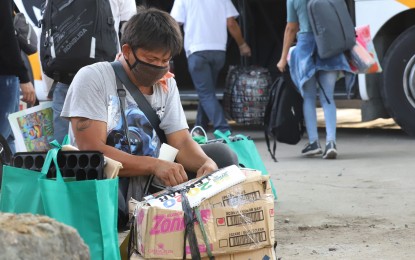
MANILA – The Balik Probinsya, Bagong Pag-Asa (BP2) program and the Hatid Probinsya program are two government initiatives with different objectives and target beneficiaries, a government official clarified Tuesday.
BP2 Council Executive Director Marcelino Escalada Jr., who is also general manager of the National Housing Authority (NHA), said the Balik Probinsya program is a long-term program of the government intended for Metro Manila residents who want to return to their provinces "for good."
He said BP2 beneficiaries are provided certain packages and assistance upon return to their provinces.
Under the BP2 program, the government will introduce a sustainable project scheme and rationalized system of fiscal incentives for export-oriented and domestic-oriented enterprises, as well as support for micro, small and medium enterprises to qualified beneficiaries.
President Rodrigo Duterte signed on May 6 Executive Order No. 114 institutionalizing the Balik Probinsya program, which aims to address Metro Manila's congested urban areas by encouraging people, especially informal settlers, to return to their home provinces.
Escalada said the program has three phases of intervention: immediate, mediate, and long-term.
In the immediate phase, he said, those who wish to return to their provinces will be provided transportation, cash assistance amounting to PHP15,000 and livelihood opportunity.
"The immediate ones are all interventions that are currently taken by the departments. It means to say, today until the end of December 2020. We will be using our own funding, our own programs and appropriations approved by Congress to respond to the immediate concern of our people who are willing to go back to their provinces right now," he said in an online presser Tuesday.
The mediate phase, he said, assures beneficiaries with decent jobs and house and lot, among others, and the institutionalization of health and education services.
"The mediate are the new programs which will be soon to introduce by the departments in 2021 until 2022. These are new programs, new creativity, new innovations, new activities that will require new fundings, new appropriations," he added.
On the other hand, the long-term phase includes the strengthening of urban development.
"The rest is more on long-term, the creation of the urban centers, the centralization of powers and tax incentives, the creation of economic zones, provision of employment and many more will happen in the next five, seven or even 10 years down the road," he said.
Hatid Probinsya
On the other hand, he said the Hatid Probinsya initiative is a short-term humanitarian effort to assist residents stranded in Metro Manila due to travel restrictions imposed during the quarantine period.
"The Hatid Probinsya initiative is just (an) assistance. These are all stranded individuals, stranded tourists, students and overseas Filipino workers (OFWs) due to lack of public transport in Metro Manila (so) the government — as part of our commitment, we provided for the sea transport, land transport as well as the air transport just to make sure that they have been assisted back home to their provinces," he said.

Stranded OFWs are urged to coordinate with the Department of Labor and Employment.
Stranded students, on the other hand, are encouraged to coordinate with the Office of the President (OP), Presidential Management Staff (PMS), or the Department of Transportation (DOTr).
Stranded tourists, meanwhile, may coordinate with the Department of Tourism (DOT).
The Department of Social Welfare and Development (DSWD) will assess and evaluate the stranded individuals. It will then provide recommendations and assistance to them.
Escalada said the implementation of both the Balik Probinsya program and the Hatid Probinsya initiative are in compliance with health protocols and guidelines of the Inter-Agency Task Force for the Management of Emerging Infectious Diseases to contain the spread of the coronavirus disease. (PNA)
